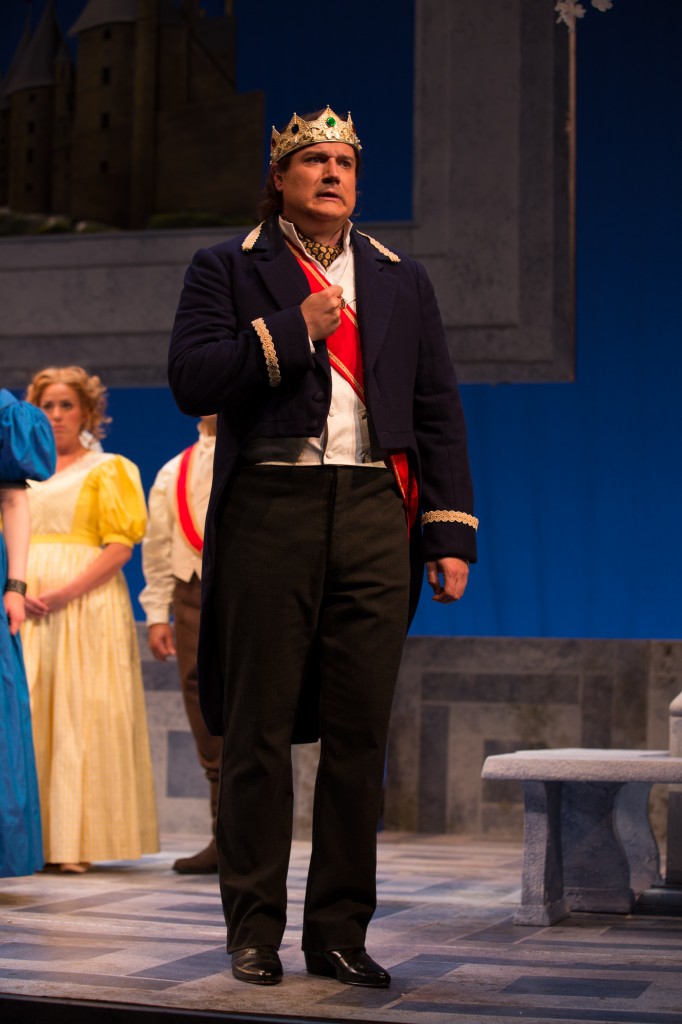Odyssey Opera’s polished Verdi comedy fit for a king
Odyssey Opera launched its first festival season with a fully staged performance of Verdi’s comic Un giorno di regno Wednesday night. Like the company’s first event, a concert performance of Wagner’s Rienzi, King for a Day is a genuine operatic rarity. The performance at the Boston University Theatre Wednesday evening was a treat, abetted by a polished production, strong singing, and attentive conducting.
The opera is inspired by the habit of the eighteenth century Polish king Stanislaus I of employing a body double in order to avoid assassination. Cavalier Belfiore is posing as the king, and is enjoying his newfound power by relaxing at the Baron Kelbar’s estate. He even decides to use his power to solve a few problems, such as to prevent the ill-suited marriage between the old, greedy Grand Treasurer, La Rocca, and Baron Kelbar’s daughter, Giulietta—who is actually in love with La Rocca’s nephew, Edoardo. But Belfiore soon faces problems of his own when his lover, the Marchesa of Poggio, arrives. The Belfiore evidently did not (or could not) inform the Marchesa of his new job, and he cannot recognize her or risk breaching his duty to the king. Things come to a head when the Marchesa threatens to marry the Belfiore’s rival if he continues his masquerade.
Verdi’s opera was a flop at its 1840 premiere. It was composed in an opera buffa style that was going out of fashion, with singers who had no experience with comedy. The impact of its disastrous opening was such that Verdi swore off writing opera, and in any case, he did not write another comedy until Falstaff at the end of his career.
Un giorno di regno fares well given such inauspicious beginnings. It is a Rossinian romp, interspersed with melodic lines indebted to Bellini. But the mature Verdi is foreshadowed in the heroic cabalettas for the women. The opera certainly isn’t as graceful or deft as the greatest comic bel canto masterpieces, and the second act (of two) feels dramatically thin. Moreover, the amount of repetition poses a challenge.
Fortunately, staging and conducting united to turn potential problems into an asset. For example, the back-to-back lovelorn arias for Giuletta and the Marchessa might seem redundant. But in this production, both characters sing their arias one after another while being dressed by their servants. This explicitly underlines the parallel between the two characters, and the dramatic situation gains strength. In purely musical matters, the act I finale, which consists of one long repeat, is accelerated joyously the second time under Gil Rose’s vibrant conducting, and the result is exhilarating.
As the king of the titular one-day reign, baritone Michael Chioldi was the vocal and dramatic standout of the evening. With such imposing regal bearing, it’s no wonder no one questions his masquerade. Yet at the same time he is entirely sympathetic as a man who’s caught between love and honor. He easily dominates ensembles with his dramatic baritone, but just as easily modulates his instruments down to intimate asides.
Soprano Amy Shoremount-Obra is almost Chioldi’s equal. Dramatically, she is his peer—a little nervous, perhaps, in her opening moments, but riveting in her second act confrontation with Belfiore, in which her challenging gaze froze both her hapless lover and the audience. Vocally, she thrilled with laser-like top notes and a secure coloratura, but she proved underpowered in Verdi’s heroic cabalettas. She was beautifully plangent, though, in the attendant cavatinas, and, to be fair, she had the most difficult music in the opera.
Jessica Medoff was a satisfying Giulietta. She sang confidently and with nuanced attention to line, and she depicted a youthful, impetuous, and vivacious character. Her counterpart, Yeghishe Manucharyan, brought a beautiful but inert tenor to the role of Edoardo. When singing about his love for Giulietta, Manucharyan was fantastic, and his perfectly even and perfectly supported tenor was a delight. But his high notes in moments of dramatic declamation were marred by scooping, and when he didn’t have a long melodic line to spin, his singing fell flat.
Filling out the last two major roles were David Kravitz, who brought a ringing baritone and impeccable comic chops to the treasurer La Rocca, and James Maddalena as the Baron. Maddalena’s baritone has little body in the high notes, though his frail tone was at least apt as a portrayal of a touchy, over-the-hill baron. The chorus sang with discipline and were a versatile bunch, providing comic relief when not listening to the principals lament and complain.
In its first staged production, Odyssey Opera served up a striking but tasteful design, neither stuffy nor bewilderingly abstract. The only moment it faltered was when lighting was used in the second act to highlight individual characters; the effect was more distracting than useful. But that was a small blemish on an otherwise rousing performance.
Un giorno di regno will be repeated 7:30 p.m. Friday at the Boston University Theatre. odysseyopera.org
Posted in Performances

